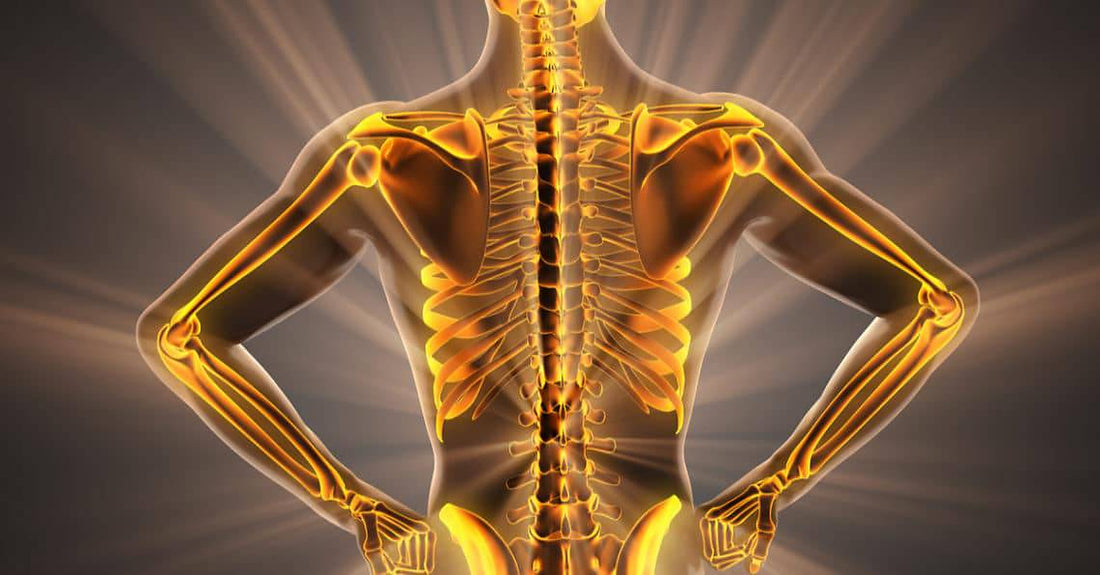As we age, maintaining bone health becomes essential to reducing the risk of osteoporosis—a condition characterised by weakened bones and a heightened susceptibility to fractures. This post outlines key nutrients and lifestyle choices that support bone health, aiding in the balance of bone resorption and formation that is fundamental to bone density and strength.
Understanding Bone Remodelling
Bone tissue is constantly in a state of renewal through a process called bone remodelling, involving two primary cells: osteoclasts, which break down old bone, and osteoblasts, which build new bone. The balance between these processes shifts over time, often resulting in more breakdown than rebuilding, especially in older adults and post-menopausal women. A well-rounded approach to nutrition, including key vitamins, minerals, and nutrient-rich foods, is crucial to preserving bone density and ensuring skeletal integrity.
Calcium: The Foundation of Bone Health
Calcium forms the structural basis of bones, with 99% of the body’s calcium stored in bones and teeth. Key sources of calcium include:
- Dairy products: Yogurt, cheese, and milk
- Leafy greens: Spinach, collard greens, and kale
- Fish: Sardines and salmon with bones
- Fortified foods: Various plant-based milks and juices
For those unable to consume dairy, plant-based alternatives can be effective when fortified with calcium. However, to ensure optimal absorption, calcium intake should be accompanied by sufficient levels of vitamin D.
Vitamin D: Enhancing Calcium Absorption
Vitamin D is essential for calcium absorption and thus plays a central role in bone health. Natural sunlight triggers vitamin D synthesis in the body, yet many factors, including lifestyle, geographic location, and skin type, can limit sun exposure. For those needing dietary sources of vitamin D, consider:
- Fatty fish: Tuna, mackerel, and salmon
- Egg yolks
- Fortified foods: Such as cereals and plant-based milks
For individuals at risk of deficiency, supplementation may be advisable after consultation with a healthcare provider, particularly during winter months when sun exposure is reduced.
Seaweed and Kelp: Iodine-Rich Minerals for Bone Health
Kelp and other seaweeds are rich in a variety of minerals essential to bone health, including iodine, which plays a unique role in regulating thyroid hormones that influence bone growth and turnover. Additionally, seaweed provides a blend of minerals such as magnesium, calcium, and trace minerals that collectively enhance bone metabolism and the structural integrity of bone tissue. Iodine from seaweed supports the thyroid, which is closely linked to bone density and skeletal health, making kelp a valuable addition to a bone-supportive diet.
Herbs for Bone Density: Horsetail and Nettle
In addition to minerals from seaweed, horsetail and nettle offer concentrated sources of bone-supportive compounds:
- Horsetail: Known for its silica content, which supports collagen formation, horsetail contributes to bone flexibility and density, crucial for reducing fracture risk.
- Nettle: A nutrient-dense herb rich in calcium, magnesium, iron, and vitamins C, D, and K, nettle facilitates bone metabolism and can be consumed as tea or in supplement form.
Optimising Mineral Absorption and Avoiding Depletive Substances
Bone-supportive nutrition hinges not only on mineral intake but also on promoting effective absorption. A balanced blend of minerals, such as calcium, magnesium, potassium, and trace minerals like zinc, supports more efficient utilisation of nutrients by the body. Avoiding substances that deplete minerals is equally important:
- Excessive caffeine and alcohol: These can inhibit calcium absorption and lead to mineral loss over time.
- High-sodium diets: Excess salt can contribute to calcium excretion through urine, affecting overall bone density.
- Smoking: Smoking accelerates bone loss and disrupts bone remodelling processes, weakening bone structure.
Additional Bone Health Practices
To complement dietary measures, consider these additional practices:
- Weight-bearing exercise: Activities like weight training, brisk walking, and resistance exercises stimulate bone remodelling and help strengthen bones over time.
- Mindful diet choices: Prioritise nutrient-dense foods, particularly those high in calcium, magnesium, and vitamin K, which collectively enhance bone density and reduce risk factors for osteoporosis.
Maintaining strong bones is possible with a holistic approach that integrates nutrition, lifestyle, and awareness of factors that influence bone remodelling. By incorporating calcium-rich foods, vitamin D, seaweed, herbs like horsetail and nettle, and practicing mineral-conscious habits, you can support healthy bones and reduce the risk of osteoporosis. Taking preventative steps today can have a lasting impact on bone health, promoting resilience and mobility for years to come.
Invest in your bone health and build a stronger foundation for the future.

